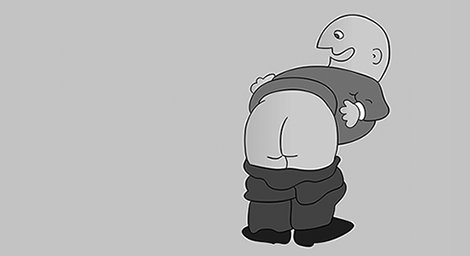|
|
|

September 4th, 2015 ¦ Marsha Jacobson -

At his wedding, my youngest son stood up to give his much anticipated speech. His reputation as a public speaker is well known and he didn’t disappoint. His two older brothers had spoken about his eccentricity and how, as much as they love him, he is the weirdest guy they know. Half way through his, on point, hilariously funny speech, he calmly addressed his brothers’ comments by walking to the centre of the dance floor, pulling down his pants and slowly mooning everyone, possibly performing the first ever groom-moon.
Along with many others, I gasped and I held my mouth, muffling the words – OMG. I can only describe what happened next as a piece of my life flashing before my eyes. I realized many things in a matter of seconds. Here they are:
- I raised my kids to follow their truth, so put my money where my mouth is.
- Just because I wouldn’t do it doesn’t mean it shouldn’t be done.
- This kind of humour makes him uniquely him and I love all of him.
- Who cares what other people think.
My perception went from horrifying to hilarious in seconds and I laughed harder than anyone. Turned out the “moon” was hilarious to most and to those who weren’t amused – tough! I felt incredibly proud that I had raised a kid who could step away from the expected and be so okay with it. And seriously, is this any more risqué than string bikinis?
My quirky son is a paediatric resident and appreciates fully the frequent tragedy of life. He has more than his fair share of anxiety and holds onto a strong moral code, heading, each year, a Movember team – in great humorous spirit as his moustache growth is puny at best. His ability to find the fun in a life that so often feels overwhelmingly heavy is completely necessary so that when he has to, he can be his best.
Unlike others, I am privy to my son’s back-story. I don’t feel I have to explain to anyone why I am so proud of his “mooning” but I am doing so, as I believe the lesson to us all is to judge the actions of others less quickly and less harshly. My son would laugh at this last statement as one of the things he is fond of saying is “I judge people quickly and harshly with very little information!” Did I mention he’s hilarious?
September 11th, 2013 ¦ Marsha Jacobson -
When I became a parent for the first time thirty years ago, I was focused on sleeping through the night, first colds, milestones and solid foods. I think it’s just as well that parents don’t get to see the whole journey at once. There may be far less children born if we did.
From the moment my children were born, I did everything in my power to ensure their happiness. For every unhappy situation that arose, I was right there to provide a solution. If they felt anxious about doing something, I would tell them they were wonderful and they could do anything. If they felt unloved by friends, I would make sure they knew how lovable they were. At every turn, I tried to take away their pain because I understood happiness to be the absence of emotional pain. This unrealistic perspective and my inevitable failure to control my children’s happiness left me feeling, on a regular basis, that I was falling short as a parent. I now understand that I was attempting to do the impossible. A person’s feelings belong to him or her, as do the experiences that produce those feelings. My children’s feelings were not mine to have, to face, or to deal with.
This new understanding forced me to recognize that my parenting perspective needed revision. Facing adversity, disappointment, envy, sadness, and fear are natural and inescapable emotional experiences in all our lives. A child not doing well on a test, being rejected by a friend, not being chosen for a team, losing a pet or loved one, or fearing monsters under the bed are all situations that most parents can identify with. At times like these it would feel counterintuitive as a loving parent to withhold comfort, and I’m not suggesting we do. Comfort and love are to parenting as air is to life. I would like to suggest, however, that we add another layer to our parenting realm that I believe can dramatically increase our children’s chances for both a happier childhood and a happier adult life.
Emotional pain exists for similar reasons that physical pain exists. If we heed our physical pain, we learn how to live away from danger and harm. Similarly, emotional pain, if addressed properly, can help us live harmoniously with ourselves and with others. To learn from our emotional pain we must face our feelings, understand them, and ultimately deal with them in healthy and productive ways.
Children who learn to deal with all their feelings, not only the happy ones, do themselves a great service. These are the children who will develop a strong sense of self and will be more able to stand up to bullying, develop leadership qualities, and have the determination and perseverance that will make them more successful in school, in relationships, and in their adult lives.
June 18th, 2013 ¦ Marsha Jacobson -
Children don’t start out avoiding feelings of sadness, frustration or anxiety. They want to talk about them as much as they do the more comfortable feelings. But they quickly learn that these feelings are often taboo. Parents can make an enormous difference to this.
Children will often be your best guides and help you to help them talk about their feelings. Children ask questions, lots of them. Answer all your children’s questions with honesty, particularly when they are about negative feelings. Often, our initial reaction is to console, explain or eliminate negative feelings. This does not provide your child with the tools to deal with similar situations in the future.
For example, if your child expresses fear, avoid reactions like, “There’s nothing to be afraid of,” or, “Don’t be scared.” This can make your child feel unheard and shuts down communication. Accepting all of your child’s feelings, allows your child to accept their own feelings and work with them.
October 17th, 2012 ¦ Marsha Jacobson -
When my oldest son was about eleven, fear of his mortality hit him like a ton of bricks. I did what I believed any loving parent should or could do. I lay under those bricks with him, barely able to breathe. For weeks my husband and I tried to console him but to very little avail. I would hear his running feet as they charged from his room to ours and my heart would lurch at the anticipation of what lay ahead. The tears streaming down his face would mimic my own internal ones coursing through my veins.
Through the clouded vision of my racing heart, I would tell him that he was too young to worry about death and that it was a long, long way away. I assured him that we too were healthy and would live long lives. In summary, in trying to fix his feelings of anxiety, I lovingly lied.
Unable to cope, we turned to a psychologist for help who, after interviewing my son, my husband and I, told me quite bluntly that my son would be fine but that I had a problem. These words were unwelcome but needed. I understood for the first time that my children were truly separate from me. My son’s demons were not mine to have or deal with. I would like to say that I became a better parent there and then but I didn’t. However, a seed had been planted and slowly my thinking and the way I approached parenting, changed.
Eighteen years later, my daughter faces a similar anxiety but I am happy to say that she is dealing with a different parent. I no longer give placatory untruths but instead allow her to feel what she wants to. Sometimes, she cries for a long time and I give her my time, my love and my arms. With every sob, I feel her strength grow and prepare her to face other adversities that life will most surely provide her.
I let her know that I understand how fearful she is and I sometimes share my own fears and tell her about her brother’s. I don’t take away her feelings as these are the very tools she needs to grow into a healthy adult. When we listen to our feelings, especially the uncomfortable ones, they become our emotional compass. We learn that we can steer our way through life by making our feelings work for us and not against us. When we understand what we feel even in the most adverse situations, we can choose courage, persistence and acceptance over helplessness and its close partner in crime, free-floating anxiety.
|
|
|








